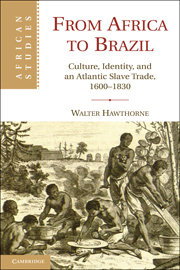Introduction
Published online by Cambridge University Press: 05 September 2012
Summary
In 1492, the Early Modern Atlantic was born. After that date, sailing ships connected distant parts of the Atlantic in new and dynamic ways. As people, trade goods, and ideas flowed across the ocean, African, American, and European cultures and economies were radically reshaped. For several hundred years, American Indians would die in tremendous numbers from diseases that white explorers and settlers introduced and wars they waged; Europeans would colonize much of the Americas and establish plantations that produced exports for Old World metropoles; and blacks would labor on those plantations as Europe shipped what ultimately was about 12.5 million enslaved Africans from coastal ports in the largest forced migration in human history. To illustrate the magnitude of this migration, before 1820 about three-quarters of all people arriving in the Americas hailed from Africa.
It is only over the past several decades that studies using the Early Modern Atlantic as a unit of analysis have become popular. Many scholars who examine Atlantic history see Europeans as dominating Atlantic interactions and shaping transformations. They equate the Atlantic basin with European civilization. These scholars marginalize Africa and reduce Africans’ contributions to the construction of an Atlantic World to merely labor alone. However, historians who reject Eurocentric approaches to the past see considerable African and Afro-American agency. That is, they view Africans and their descendants in the Americas as controlling some of the processes that led to the creation and metamorphosis of an Atlantic economic and cultural system. Following John Thornton, “Africans were active participants in the Atlantic world, both in African trade with Europe … and as slaves in the New World.”
- Type
- Chapter
- Information
- From Africa to BrazilCulture, Identity, and an Atlantic Slave Trade, 1600–1830, pp. 1 - 22Publisher: Cambridge University PressPrint publication year: 2010

